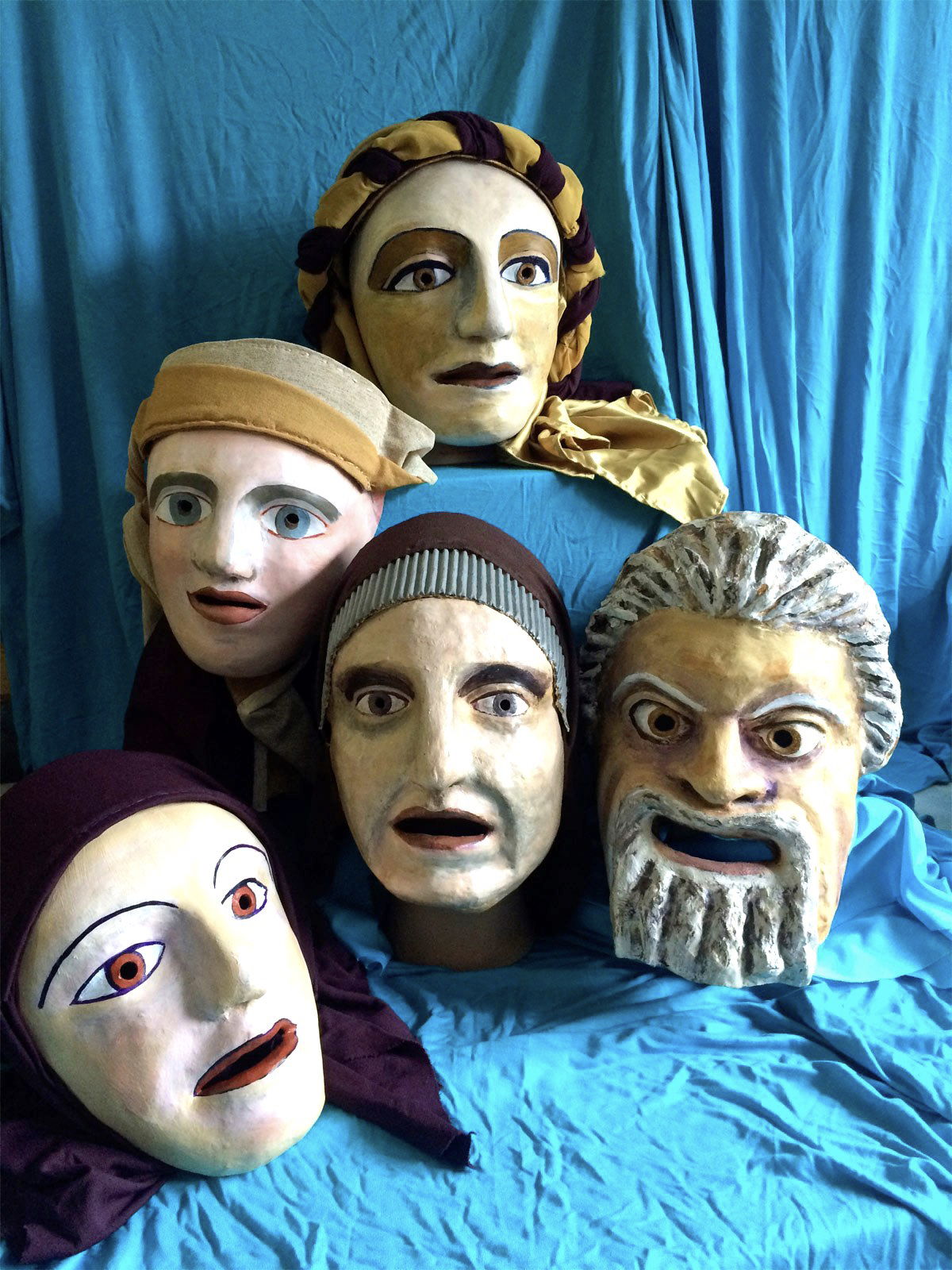This was a performance by my company of selected scenes from Euripides' play in English translation, given before an invited audience on 2nd February 2018 at Creation Box, Makespace Studios, Waterloo, London. It was a piece created to showcase the work done in a ten day workshop/rehearsal for which I employed six dancers, two actresses and three singers, all professionals and introduced a Narrator to explain the story and fill in the missing parts of the action. All performers, including me, are women, hence the title. We gave one performance, in the workshop space, and made a simple recording of it, which can be seen on YouTube.
Much of our work focussed on the choral dances. Whilst in previous projects I have employed actresses and actors who have been able to dance whilst speaking the text, this time all the chorus were dancers by profession (although two of them also have actor training). For this performance of the Medea odes the chorus concentrated on dancing whilst 'offstage' actresses spoke the text. The difference was immediately apparent in the precision, dexterity and sheer volume of moves learned in a very short space of time by this chorus. Moreover, their superior sense of spatial awareness meant that after a few days of working together in mask, there were no collisions despite the fact that a complex choreography was being demanded of them. I also included some of the choice protagonist scenes for the two actresses to perform. Medea, being a larger than life figure, I gave the role to one who is particularly tall and she wore a sizeable mask. I envisage the magical powers of Medea extending beyond her skill with poisons into her ability to persuade other figures in the drama to comply with her wishes. The chorus, for example are, I suggest, in part possessed by her passion and she recruits them into a 'monstrous regiment'. They retain enough independence of spirit, however, to express their horror but not enough to take effective action.
Having at least one of Medea's sons present for some of the scenes seems to me essential. One of the advantages of mask is that a small adult (in this case me) can take the role, with some degree of credibility. I entered clutching a toy horse (which for this sole child seemed to be his only friend in a world of hostile parents and adults more generally). Playing with it in a low key way gave me, as child, something plausible to do during the nurse and tutor exchange while not taking the focus of attention away from them. As a performer it helped me internalise my role, keeping it alive for me. I simultaneously stayed aware of the technical need to glance up momentarily once or twice to show my mask to the audience, to send the horse well downstage just before the tutor came over to me (so that it didn't become a tripping hazard - especially important for the limited vision of the actor in mask) and to get myself into a position from which I could jump up suddenly on a particular cue. I left the horse onstage when I exited with the tutor but subsequently re-entered, my move explained by the fact that I was returning to collect my toy. I give these as examples of the way we work as masked actors, utilising a sort of double awareness. From Plato’s account of Ion, the rhapsode, it is clear that he operated in very much the same way!
Some years ago I rehearsed (unmasked) the Creon and Medea scene in which she persuades him, against his better judgement, to grant her one more day in Corinth. On this occasion the actress brought her two year son with her and used him quite literally to play on Creon's fatherly feelings. There was no way the actor playing the King could refuse her request. In our recent production we revisited this scene in rehearsals as background experience for the performers. I would have liked to spend more time working on the theme of Medea as mother and her struggle with the conflicting elemental forces she embodies, but there is a limit to what can be achieved in ten days and so we left this as an area to be explored at a later date.
As with my other projects, this piece had no external funding and was put together with limited resources, so that, for example in was necessary for the audience to see 'behind the scenes' including the putting on and taking off of masks etc. This was hardly a problem as it is in keeping with our own modern theatrical conventions. We also utilised a practice from Japanese Noh theatre in having one of the characters (in our case, Jason) represented by a garment. For this it was necessary to employ great economy in order to avoid a humourous effect. This was in the very last scene when I adjusted the text to have Medea address him in this form, making answer to his unspoken questions. And the actress stood in one corner on a plain grey box with a light behind her. With these simple cues the audience were left to imagine the chariot provide by her grandfather the sun god and the dead bodies of her sons.
Masks by Chris Vervain for Medea Without the Men, February 2018.

